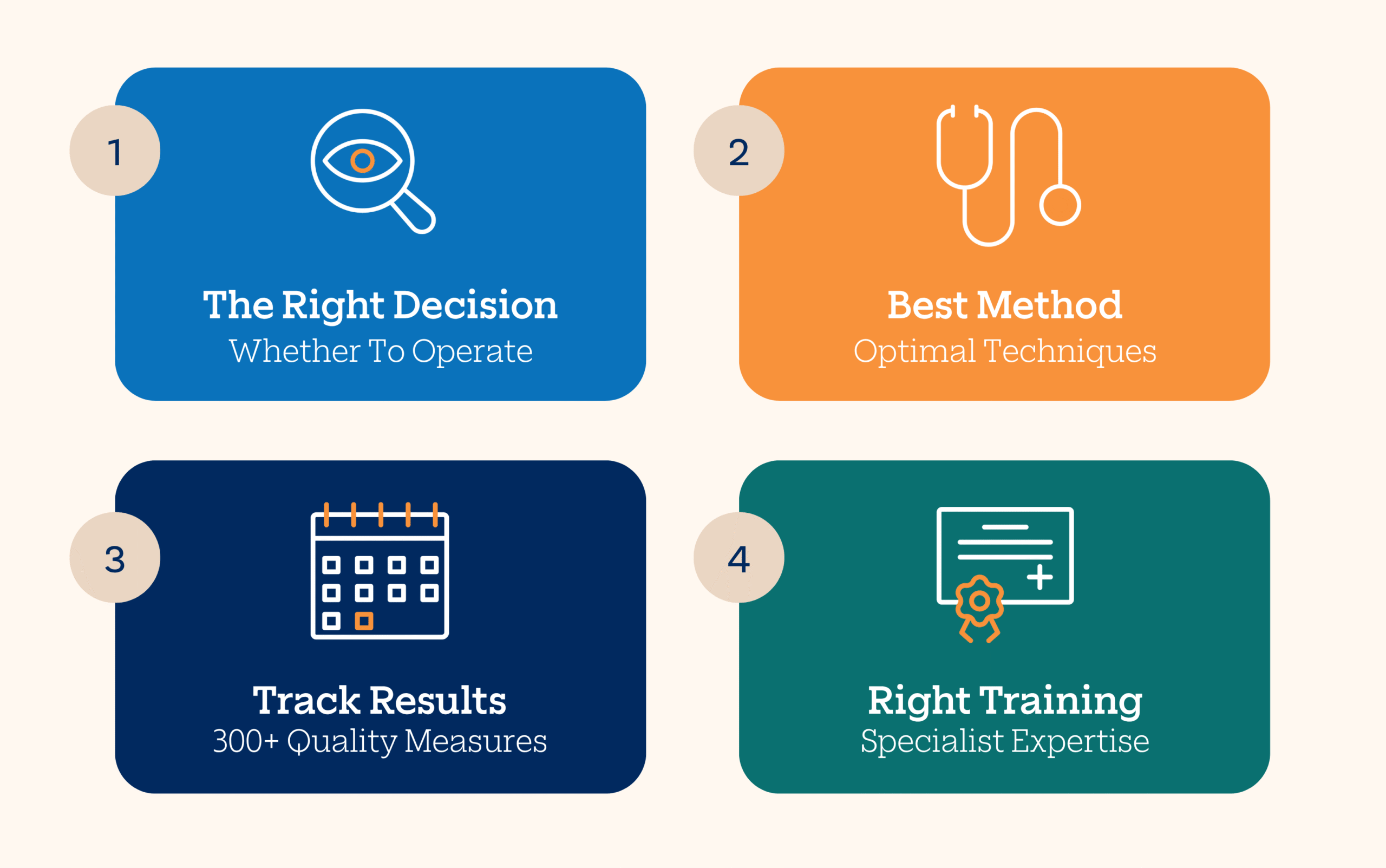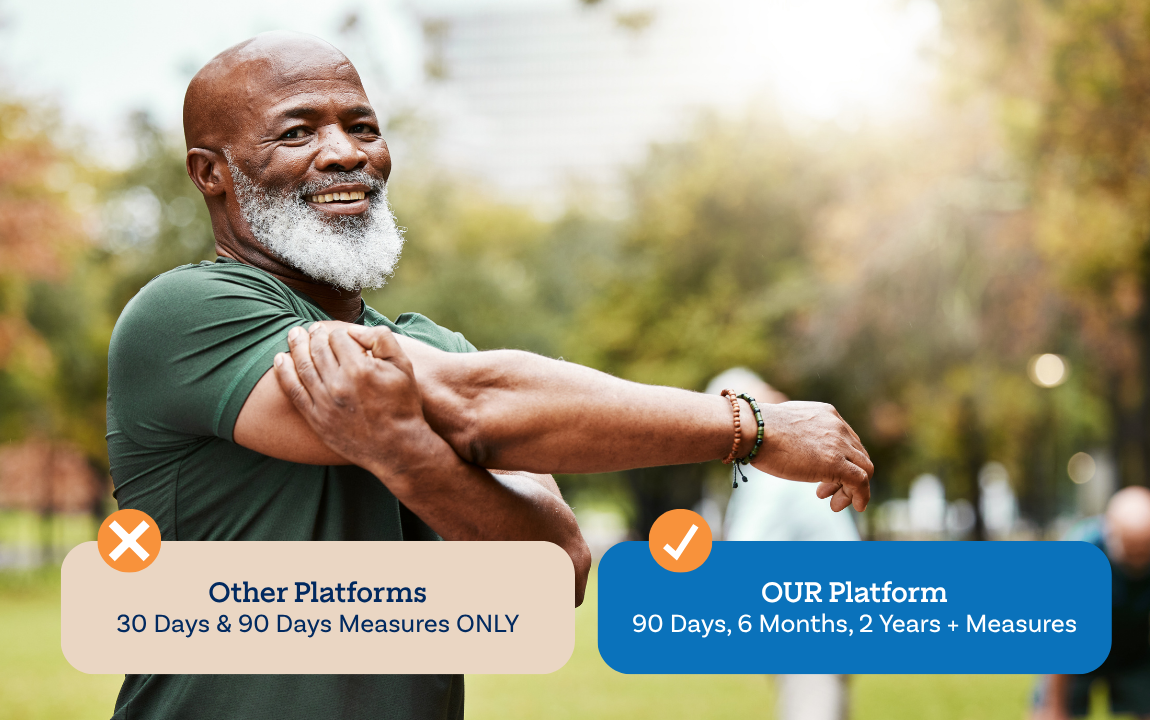Here’s something most patients don’t know: for the same surgery, some surgeons have problem rates three times higher than others.
Yet patients make this life-changing decision based on online reviews about office cleanliness and how likable the surgeon is. Or they use a referral from their family doctor, who might not know the surgeon’s actual track record.
If you’re facing surgery, you probably feel overwhelmed by the choice ahead of you. How do you tell which surgeons always deliver the best results?
At SurgeonCheck, we spent years finding the answer. We believe you deserve to know exactly how we find the surgeons who can give you the best chance of success.
Why We Built This Differently
SurgeonCheck was built by practicing surgeons who spent decades in the operating room and know all of the problems that can arise. We’ve seen firsthand what separates excellent surgeons from average ones.
How We Help You Avoid Surgery You Don’t Need
Here’s what many patients don’t know: research shows that a large percentage of surgeries are unwarranted, even as high as 30 percent¹. The best surgeons know when NOT to operate. They will suggest other treatments that might work just as well.
We study whether surgeons make the right choice about when to suggest surgery.
What this means for you: You’re more likely to get surgery only when you truly need it. You’ll avoid procedures you don’t need that could put you at risk without helping.
Why We Track Which Surgery Method Your Surgeon Chooses
The technique your surgeon uses can greatly affect how fast you recover and whether you’ll have problems. Take lung surgery as an example: some surgeons still use large incisions measuring 9-10 inches. Others use small-incision techniques – known as the laparoscopic approach. The small-incision approach usually means less pain, faster healing, lower infection rates, and shorter hospital stays2.
Yet not every surgeon always chooses the best method for each case. We track which surgeons pick the best techniques and have the skills to do them well.
What this means for you: You’re more likely to get the surgery approach that will give you the fastest, safest recovery with the least pain and problems.
How We Spot Patterns Other Platforms Miss
Most quality platforms only look at what happens in the first 30-90 days after surgery.
We track results for years after surgery.
This matters because many serious problems don’t show up until months or years later. Things like needing another surgery after joint replacement or hernias after abdominal surgery.
We’ve studied billions of medical claims covering millions of procedures. This lets us spot real patterns in surgeon performance that smaller data sets would miss.
What this means for you: Our suggestions are based on the complete picture of a surgeon’s track record. Not just short-term results that might look good at first, but hide long-term problems.
The Four Ways We Check Every Surgeon

1. Do They Make the Right Choice About Whether to Operate?
We look at whether surgeons suggest surgery only when it’s truly needed and likely to help. The best surgeons have the confidence to say “let’s try other options first” when right.
2. Do They Choose the Best Surgery Method?
We track whether surgeons pick the techniques that lead to better results. Like small-incision, laparoscopic approaches when they’re the better option for your case.
3. What Are Their Actual Problem Rates?
This is where we get really detailed. We use over 300 quality measures, custom-made for each type of surgery.
4. Do They Have the Right Training for Your Procedure?
We check whether the surgeon is properly trained in the most relevant specialty for your surgery. For example, both general surgeons and thoracic surgeons can do lung surgery. However, thoracic surgeons consistently achieve better results.
The Quality Guards That Protect Your Choice
Minimum Experience Rules: We require minimum case volumes that vary by procedure. This ensures our recommendations aren’t based on lucky streaks or small sample sizes.
Fair Comparisons: We only check planned surgeries where we can make fair comparisons between surgeons. We exclude emergency procedures where patient conditions vary too much to judge surgeon performance fairly.
No Pay-to-Play: Unlike many platforms, surgeons cannot pay us to be suggested or improve their rankings. Every suggestion is based purely on objective data.
Why Our Approach Gives You Better Results
You Get Chosen Excellence: We don’t list every surgeon and make you guess who’s good. We only recommend surgeons with proven track records of superior results. If a surgeon doesn’t meet our standards, they simply won’t appear in your search results.
You See What Really Matters: While review sites tell you about waiting room comfort and bedside manner, we consider infection rates, repeat surgery rates, and long-term success rates. These are the factors that actually determine whether your surgery will be successful.
What We Want You to Know About Our Limits
We believe in complete honesty, so here’s what our system can’t do:
Limited to Planned Procedures: We can’t check emergency surgeries where patient conditions and circumstances vary too much to make fair surgeon comparisons.
Data-Based Study: Our suggestions are built on medical claims data. This captures what happened but doesn’t include every factor that might affect results.
Volume Rules: For rare procedures where few surgeons have significant experience, we may have limited suggestions in some areas.
The Difference This Makes for Your Peace of Mind
When you’re facing surgery, you shouldn’t have to guess whether you’re choosing the right surgeon. You shouldn’t have to rely on reviews about parking convenience. You shouldn’t worry that your doctor’s referral is based on personal relationships rather than performance.

Our system gives you what you really need: recommendations about which surgeons deliver the best results for your specific procedure. You can move forward with confidence, knowing your choice is backed by a complete analysis of real patient results.
Find Your Surgeon With Confidence
You’re making one of the most important healthcare decisions of your life. You deserve to know that your surgeon has a proven track record of success. They should use the best techniques and only suggest surgery when it’s truly in your best interest.
References
- P. F. Stahel, T. F. VanderHeiden, and F. J. Kim, “Why do surgeons continue to perform unnecessary surgery?” Patient Safety in Surgery, vol. 11, no. 1, 2017.
- O. Mercier, “VATS versus open thoracotomy for lung cancer resection: is the game still running?” European Journal of Cardio-Thoracic Surgery, vol. 62, no. 3, 2022.


